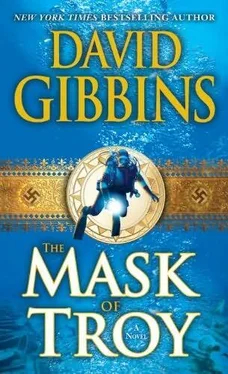David Gibbins - The Mask of Troy
Здесь есть возможность читать онлайн «David Gibbins - The Mask of Troy» весь текст электронной книги совершенно бесплатно (целиком полную версию без сокращений). В некоторых случаях можно слушать аудио, скачать через торрент в формате fb2 и присутствует краткое содержание. Жанр: Триллер, на английском языке. Описание произведения, (предисловие) а так же отзывы посетителей доступны на портале библиотеки ЛибКат.
- Название:The Mask of Troy
- Автор:
- Жанр:
- Год:неизвестен
- ISBN:нет данных
- Рейтинг книги:3 / 5. Голосов: 1
-
Избранное:Добавить в избранное
- Отзывы:
-
Ваша оценка:
- 60
- 1
- 2
- 3
- 4
- 5
The Mask of Troy: краткое содержание, описание и аннотация
Предлагаем к чтению аннотацию, описание, краткое содержание или предисловие (зависит от того, что написал сам автор книги «The Mask of Troy»). Если вы не нашли необходимую информацию о книге — напишите в комментариях, мы постараемся отыскать её.
The Mask of Troy — читать онлайн бесплатно полную книгу (весь текст) целиком
Ниже представлен текст книги, разбитый по страницам. Система сохранения места последней прочитанной страницы, позволяет с удобством читать онлайн бесплатно книгу «The Mask of Troy», без необходимости каждый раз заново искать на чём Вы остановились. Поставьте закладку, и сможете в любой момент перейти на страницу, на которой закончили чтение.
Интервал:
Закладка:
Jeremy stared at the unexcavated deposit on the edge of the wall, and took a few steps over. ‘This must be what Maurice wanted me to see. Arrowheads. Beautifully excavated, and still in situ. Has anything like this ever been found at Troy before?’
‘Not in situ, embedded like that.’ Dillen lay back down on his mat, propped on his elbows. ‘Maurice said you were the man for this?’
‘It’s my hobby. Archery.’ Jeremy got down on his knees and elbows and edged close, until his face was only a few inches away, then reached out and gently touched one of the arrowheads. ‘Fascinating. There’s a small collection like these on display in the British Museum, in the same case as the artefacts they have from Schliemann’s excavation at Troy. A few miserable pots, frankly. Most of it went to Germany, of course. But it makes you wonder what Schliemann really did find down there.’ He jerked his thumb in the direction of Schliemann’s trench. ‘Anyway, Jack and I met up for lunch in the BM a few days before he came out here, and we had a quick look at the Mycenaean stuff. What you’ve found here is fantastic, where scientific excavation really comes into play. This is what Schliemann could so easily have missed, hacking down aggressively with picks and shovels, going for the treasure. You see what I mean? You’ve got two completely different shapes of arrowhead, in exactly the same context. These were shot by archers standing side by side, at the same time on the same day. If you’d seen these individually in a museum collection, or hauled out of the spoil heap from an excavation like Schliemann’s, you’d be thinking mainly in terms of typology, a time sequence, evolution, maybe that nastier barbed one being a more effective later type. What you’ve got here shows you’d be completely wrong.’
Dillen stared hard. ‘Here’s a thought, then. The Mycenaean Greeks were not like the Egyptians, or the Hittites. They were never a single kingdom, and if we’re to believe Homer, they were only ever united for this famous expedition, under a single paramount leader.’
‘You mean Homer’s king of kings. Agamemnon.’
Dillen nodded. ‘Each of the Mycenaean palaces we know about – Mycenae itself, Athens, Pylos, Thebes, the others – was a kingdom unto itself, controlling its own fiefdom like a feudal barony. The clay tablet archives from those places show that the armaments industry, bronze-making, was tightly controlled by each palace, but not centralized across the Mycenaean world. There was no Enfield factory, no Springfield arsenal, but instead lots of smaller arsenals, controlled by individual palaces but under no central armaments directive, all keeping up with each other broadly in technology but with small differences. Some of the differences could even have been deliberate, to give the weapons of a particular kingdom a clear identity.’
‘I’m thinking of the ship list in Homer’s Iliad,’ Jeremy murmured. ‘All the different kingdoms sending ships and men, rallying to the cause.’
‘And then all of them standing shoulder to shoulder on the beach, men of Mycenae, Pylos, Tiryns, a hundred other kingdoms, showering the walls of Troy with arrows.’
Jeremy bent down again until his face was nearly touching the deposit, staring, murmuring numbers to himself. He then shuffled back and put the thumb and forefinger of his left hand in front of the arrows, measuring them up. He kept his hand exactly where it was, fumbled in his shorts pocket with his other hand and pulled out a compass, holding it flat and squinting along it. He rolled away and jumped up to his feet, then peered over the rampart wall at the plain of Troy before the citadel, a flat alluvial landscape of fruit trees and vegetable plantations extending towards the distant shoreline of the Dardanelles. He sighted the compass, then looked at Dillen, grinning. ‘As Jack would say, I’ll be damned.’
‘What is it?’
‘Well, the angle of impact shows that these arrows were shot at pretty well maximum trajectory. When Jack and Costas were here fifteen years ago doing their famous excavation on the ancient beach line, they found a charred fragment of an archer’s bow. Well, Costas found it, to be exact. As he’ll never cease telling you. He showed it to me, and I made a replica. I’ve shot it using arrows with bronze heads based on those British Museum examples. The compass bearing on these arrowheads points almost exactly to the place where the heli pilot showed me the remains of their trench, about two hundred and forty degrees from here, almost a kilometre away. It’s a long shot, but plausible for a Bronze Age bow with a really strong following wind, the kind the pilot said you sometimes get from the north-west coming off the sea, a real storm wind. Maybe there was one of those on the day of the assault when these arrows were fired.’
‘What’s the dating evidence for this type of arrowhead?’
Jeremy pursed his lips. ‘Late Bronze Age, definitely, but that could mean anywhere between about 1500 BC, when bronze took over from obsidian for arrowheads, and about 1000 BC, when iron took over from bronze. But even that latter date’s contentious. Scholars used to think references to iron in the Iliad were anachronisms, showing that Homer was writing about his own world in the Iron Age, around the eighth century BC. But iron arrowheads have now been found at Troy too. It’s possible that there was corroded iron in Schliemann’s excavation that he just didn’t see when he hacked his way down. Another black mark against treasure-hunting.’
‘It sounds like Troy,’ Dillen said. ‘Just when you think you’re there, that grey shroud of uncertainty settles over the whole thing again.’
‘But it’s still fantastically exciting,’ Jeremy said. ‘It’s this room that gives those arrows a date. If it’s Troy VII, then that’s Homeric Troy. The arrows were fired together from the beach line. They’re different types, from different places. These aren’t just raiders. There’s an army out there. A big, besieging army, from many different places. A Mycenaean army. It all adds up. You just need a tiny dose of faith.’
Dillen rocked back on his haunches and smiled. ‘Sometimes, you know, when I’m up here alone at night, I think I can hear music, very distant, like the backbeat to an epic,’ he said. ‘It seems to be telling me all I need to know, as if all this scientific detail, the proof, is just confirmation.’
Jeremy grinned, then pointed to a shrouded form in the corner of the trench. ‘I was wondering when you were going to bring music up. Looks like you have a hobby of your own.’
Dillen looked over. ‘Oh, that.’ He got up, stretched, walked over, and picked the object up. ‘It’s a lyre, a hand-harp, meant to be a replica of a Bronze Age lyre. I made it myself, over the last few months. It’s based on all the literary and artistic evidence I could muster, and a few archaeological discoveries.’ He carefully removed the cover, revealing a tortoiseshell soundbox with two raised arms curving outward and forward from it, with a crossbar at the top and strings leading down from it to another bar on the shell, forming a bridge. ‘The different notes come from the thickness of the strings, which are made of animal gut. All the ancient poets, the bards, used a lyre. I realized I could never hope to understand Homer without trying it.’
‘Will you play?’
Dillen replaced the cover. ‘Maybe when the digging’s over. Rebecca’s been badgering me to put Homer to music. I’m not sure if she knows quite what I mean. Sometimes I think the music is meant just to be in my head.’
‘Oh, I think she knows. When we’re together she often refers to things you’ve said. You and she seem to be on much the same wavelength.’ Jeremy cocked an ear. ‘Speaking of Rebecca, I forgot to say. I can hear someone approaching. She wanted me to warn you so you’d know she wasn’t Hiebermeyer and wouldn’t get into a panic about tidying up. I’m sure that’s her coming up the path now.’
Читать дальшеИнтервал:
Закладка:
Похожие книги на «The Mask of Troy»
Представляем Вашему вниманию похожие книги на «The Mask of Troy» списком для выбора. Мы отобрали схожую по названию и смыслу литературу в надежде предоставить читателям больше вариантов отыскать новые, интересные, ещё непрочитанные произведения.
Обсуждение, отзывы о книге «The Mask of Troy» и просто собственные мнения читателей. Оставьте ваши комментарии, напишите, что Вы думаете о произведении, его смысле или главных героях. Укажите что конкретно понравилось, а что нет, и почему Вы так считаете.












